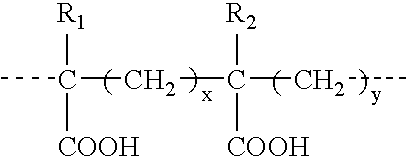Coccidial vaccine and methods of making and using same
a technology of coccidial vaccine and vaccine preparation, which is applied in the field of coccidial vaccine, can solve the problems of affecting the performance of birds, affecting the health of birds, and causing the most severe economic loss of chickens, and achieves the effect of reducing cross-infection with clostridium spp and improving bird performan
- Summary
- Abstract
- Description
- Claims
- Application Information
AI Technical Summary
Benefits of technology
Problems solved by technology
Method used
Image
Examples
example 1
Cocci Production
[0105]Composition of the Product. The microorganisms that may be used are Eimeria acervulina, Eimeria maxima, Eimeria mitis and Eimeria tenella. The origins of the stock cultures of the microorganisms are as follows. The parent of the Eimeria acervulina was obtained from T. K. Jeffers at Hess and Clark Laboratories in 1969 and thought to have been isolated by Dr. M. Farr at USDA, Beltsville, Md., which was derived from a single oocyst. The Eimeria maxima culture was derived from an interbred mixture of 10 purified isolates obtained from Georgia, Delaware, Maryland, Virginia and Texas. The parent of the Eimeria mitis culture was isolated from Gainesville, Ga. in July 1978 and was purified by single oocyst isolation. The parent of the Eimeria tenella culture was obtained from a culture maintained at Pennsylvania State University by Dr. Patten since the early 1960's, and was acquired by the University of Georgia in 1982.
[0106]Each of the Eimeria strains used was a preco...
example 2
Efficacy of Experimental Vaccine Containing Attenuated Strains of Avian Coccidia Compared with a Commercial Live Coccidiosis Vaccine and Salinomycin, an Anticoccidial Drug in Commercial Birds
[0137]The objective of this Example was the determination of the efficacy of attenuated Eimeria oocysts vaccine, in comparison with a USDA approved live oocyst vaccine (Coccivac-B) for protection of broiler type chickens from challenge with virulent Eimeria species and to compare the use of the attenuated vaccine with a conventional anticoccidial drug, Salinomycin.
[0138]The target variables were as follows. The primary variable was intestinal lesion scores. Acceptance criteria was lower post-challenge intestinal coccidial lesion scores when compared to the unvaccinated, challenged control birds. Secondary variables were (1) weight gain and feed conversion during a 7-week grow-out phase and (2) mortality. Acceptance criteria included equal or superior weight gain and feed conversion in vaccinated...
example 3
In vivo Potency Testing of Coccidiosis Vaccine, Live Oocysts, Chicken Origin
[0178]This Example presents a procedure to demonstrate the potency of harvest material from each new Eimeria production seed, as formulated in final product.
[0179]The materials for this Example include chicken feed, free of anticoccidials, SPF or broiler type chickens 1-14 days of age and chicken housing.
[0180]The first serial of final product produced and each subsequent serial produced using a new batch of production seed or seeds are tested for potency. The first serial produced, which contains all new production seeds are challenged with each species. For subsequent serials, which contain one or more new production seed(s), only those antigens representing the new seed(s) are tested for potency as described below. The final product is tested in SPF or broiler type chickens 1-14 days of age. Subsequent serials produced from the production seed are evaluated for potency using pre-formulation counts specifi...
PUM
| Property | Measurement | Unit |
|---|---|---|
| diameter | aaaaa | aaaaa |
| temperature | aaaaa | aaaaa |
| fill volume | aaaaa | aaaaa |
Abstract
Description
Claims
Application Information
 Login to View More
Login to View More - R&D
- Intellectual Property
- Life Sciences
- Materials
- Tech Scout
- Unparalleled Data Quality
- Higher Quality Content
- 60% Fewer Hallucinations
Browse by: Latest US Patents, China's latest patents, Technical Efficacy Thesaurus, Application Domain, Technology Topic, Popular Technical Reports.
© 2025 PatSnap. All rights reserved.Legal|Privacy policy|Modern Slavery Act Transparency Statement|Sitemap|About US| Contact US: help@patsnap.com



